1,200 km separate Abidjan and Bamako. Given the nonsense that goes on with overland travel in Africa, this journey was practically interstellar. In the station, veiled Mauritanian women, bearded men reading the Koran, children adorned with beads in their hair. Most passengers speaking bambara and generally in good spirits.
The boarding process had many qualities of a stampede. The bus would leave an hour late – more or less on time. I ended up in the front seat – the death seat, as it is known in Africa – next to the driver, his backup, and an Ivorian merchant who made this trip weekly. I had two liters of water, a baguette, and a package of petit beurre biscuits. On long overland journeys, I fast. There is no reason to get your bowels moving on a 24h+ ride through West Africa. I planned on eating the bread like a bird.
We crept out of Abidjan, reupping our cargo several times, refueling, delaying a journey that I hadn’t quite come to terms with. Post civil war Abidjan is like a Gbaka engine with the scar tissue of welded rattling parts, stalling but always restarting. I will miss this city very much. Whether the election, scheduled for October 31st, happens or not, I will be paying close attention to Cote d’Ivoire. I would like to soon come back.
I had something of an organized life here, one that I’m thankful for, and one that I will miss, but on the road to Bamako I am once again anonymous, and I am delighted by my renewed independence. My view in the front seat is panoramic. My seat mates are friendly. The driver is surprisingly and admirably cautious.
A few hours after leaving Abidjan, we are in Yamoussoukro, the administrative capital of Cote d’Ivoire. Félix Houphouët-Boigny, Cote d’Ivoire’s first president, moved the capital here because naturally it was his hometown and this is something African presidents do, along with putting their picture everywhere, running countries into the ground and amassing personal fortunes.
Although, in Houphouët-Boigny’s case, as Hudin aptly points out in the comments, he did not run the country into the ground. In fact, he oversaw what many called the “Ivorian Miracle,” an economic boom that made Cote d’Ivoire the prize of West Africa. However, it must be said that Houphouët-Boigny invested disproportionately in Yamoussoukro, his home town, while the west and north of the country saw little development.
Yamoussoukro is Cote d’Ivoire’s Brasilia. It is completely bizarre. The roads are absurdly wide, there are landscaped ponds that look like part of a suburban office park, and then there is the Basilica of Our Lady Peace, a replica of St. Peter’s that is 320,000 square feet and 518 feet high. It cost close to $300 million USD to build and it remains the largest church in the world. Houphouët-Boigny financed it himself and later offered it as a gift to Pope John Paul II. The pope had unsuccessfully lobbied Houphouët-Boigny to make the Basilica shorter than St. Peter’s, but he consecrated the church anyway.
Where am I again?
This was as close as I got to the Basilica, and to be honest I could care less.
I spot my first Ohio State Fan in Cote d’Ivoire. I told her I was buying from her because she was supporting the best college football team in America. She did not understand. Another example of Dead White Man’s Clothes. I bought a sprite. It turned out to be a sprite bottle filled with some kind of questionable, locally produced sugary nectar. I took about five sips and then asked myself, what the hell are you doing drinking this on a 33 hour bus trip?
Coral-like termite mound.
Leaving Yamoussoukro, we entered the Rebel controlled northern territory of Cote d’Ivoire. The Ivorian Civil War was not a conflict on the scale of Sierra Leone or Liberia. There was less fighting and certainly less brutality. There were, however, more parties involved: French soldiers, Forces Nouvelles, Young Patriots, Belarusian (yes, really) and Liberian mercenaries, the UN, and the National Army.
In Short, Ivorians had to elect a president for the first time ever (Houphouët-Boigny ruled for thirty years), the Ivorian economy had been repeatedly devastated by the falling price of cacau (Cote d’Ivoire continues to produce 40% of the world’s cacau, the largest percentage of any country), and there was widespread resentment towards the large population of Burkinabe immigrants. A law barring presidential candidates from having foreign born parents, enacted right before the 2000 election, eliminated Alassane Ouattara, the candidate representing the north of the country, from the race. This lead to a mutiny of soldiers in 2002 and it’s a mess from there. In 2010, the country remains split in two. The Government controls the southern half of the country. The north is in the hands of the Forces Nouvelles.
I did not know what to expect on the road between Yamoussoukro and Mali. According to the State Department:
Given the unpredictable and sometimes tense situation in regions throughout the country, and the ongoing presence of two distinct military/peacekeeping forces, the Department of State urges U.S. citizens to exercise caution should they travel to Cote d’Ivoire, and to take special care when traveling outside Abidjan. Security conditions in the north and in the west can deteriorate without warning.
Then there were friends in Abidjan, including a Malian who made the journey often, that told me I had absolutely nothing to worry about.
As we got further into northern Cote d’Ivoire, the number of roadblocks and police checkpoints increased significantly. Roughly one every twenty minutes. The bus company had this figured out. One young man was employed solely to run off the bus, deliver “a cadeau” to a rebel soldier, and run back on. In this way, we avoided hassle for most of northern Cote d’Ivoire:
This efficient system of run and bribe persisted until the Malian border. Around 27 seconds, you can see that he is handing the money to a soldier before running back on the bus.
And this is the 18th hole of the New Forces Links, a new destination golf course outside of Bouake!!
As we rode further north, the sun went down and the road deteriorated. The driver deftly managed all manner of potholes and tank traps. Headlights, lightning, rain, and a ridiculous argument between passengers about cost of living in Senegal. I put my feet up and enjoyed the wild ride on neglected roads lined with sweet smelling rainy season vegetation.
The light show begins around 25 seconds. Several hours later and the road is martian – red and cratered. A semi carrying firewood has overturned here:
The rebels were not a bother until an hour or so before the border. Around 1AM we rolled through a village that was unremarkable except for a number of creeping UN pickup trucks. In the bed of each truck, two UN soldiers donned with helmets sat back to back. There were New Forces soldiers milling around, but no road block.
Fifteen minutes north of this village and we were stopped by a contingent of soldiers that were not in accord with the run and bribe system. The driver got off the bus to negotiate. Many of the passengers got off to take a leak. It was then that a New Forces soldier, incensed by the number of men peeing seemingly everywhere, started demanding to see everyone’s international vaccination certificates. I was one of the men peeing all over the road and when I returned to the bus, this irate soldier had come on board, screaming that it was “interdit a pisser” (forbidden to piss).
In some ways, this was comical. In other ways, it was not. For one thing, he had a gun. I had my international vaccination certificate, but my yellow fever vaccine, the only necessary vaccine for this part of Africa, was not listed. My yellow fever vaccine was reported on a receipt from a travel clinic that I had inserted into the certificate. When he saw this, he flipped. I quickly made up a story about how this is the new way of documenting yellow fever vaccinations. It is more official, more difficult to duplicate. The receipt, with several stamps on it, looked authentic, and the soldier, dumbfounded, bought the story. For all I know, he is now demanding that people have a vaccination receipt from a clinic in addition to the certificate itself. He harassed several Malian passengers to no end. They had no vaccination certificate and eventually paid the man. Everyone was relieved when he left.
The driver had yet to return. The negotiations, whatever those entailed, took more than an hour. When he returned, he fell asleep, head on the steering wheel. I tried to sleep as well, but the windows wouldn’t shut entirely and rain soaked the right half of my body. At some point the backup driver took over and we were on our way once more. The rain stopped and I was able to sleep for a few hours. I was woken up by the driver at the Malian border. I asked him if we had passed the Cote d’Ivoire border. He said yes. Is it a problem that my passport did not get stamped? He laughed. The rebels did not stamp passports. I had been worried about my visa expiring. Turns out, if you leave overland through the north of the country, it doesn’t matter when your visa expires.
The Malian border was painless and I managed to get a few more hours of sleep afterwards. It was 6AM. It would be nearly 12 hours more until Bamako. By the afternoon, I was starting to break down. A man selling fish oil caplets was let on the bus and he yelled for an hour and a half. The bus stunk. I was covered in filth and sweat and I was more or less convinced I was developing deep vein thrombosis.
Things were bad. I fell into a catatonic state for roughly two and a half hours. Then the driver put on a Mamou Sidibe tape. A girl behind me started to sing along. I realized I was now in the land where this music is created. The final half hour and I am jubilant. One more overland journey in the books. Hello, Bamako.


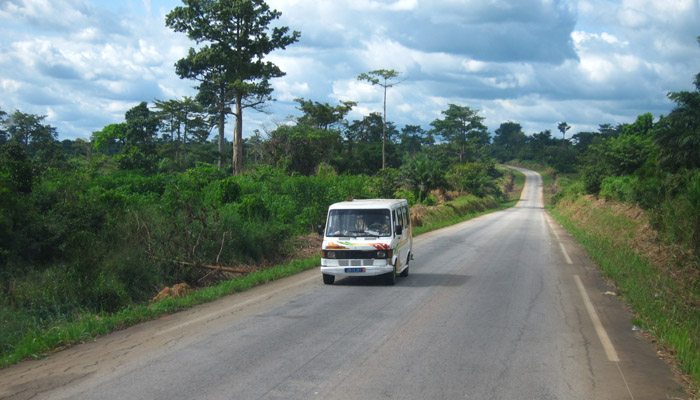
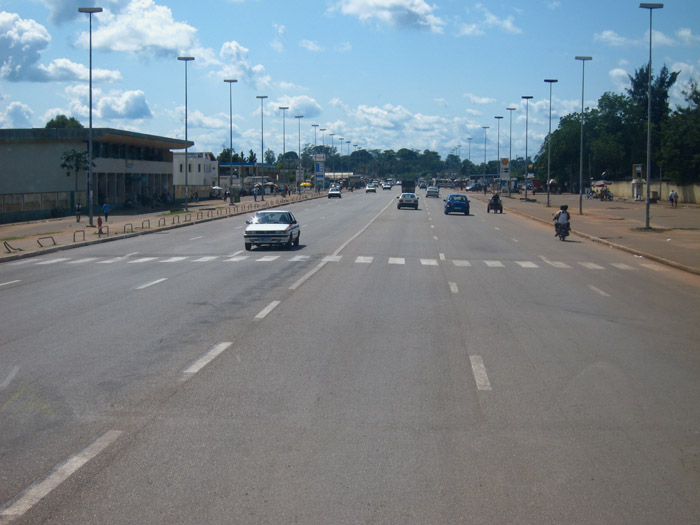
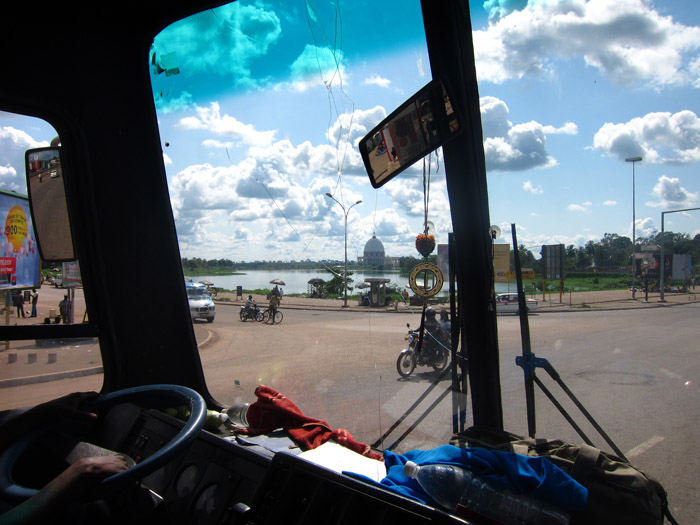
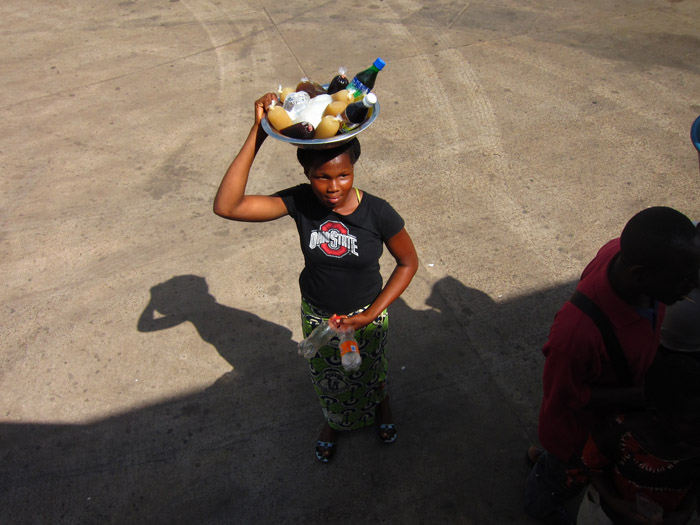
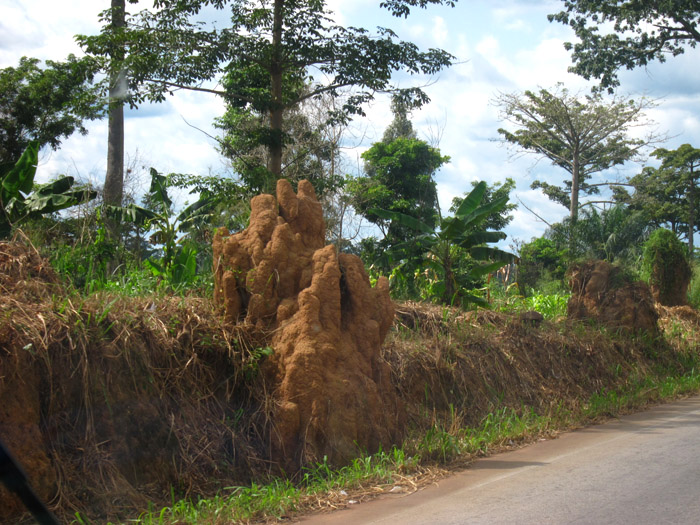

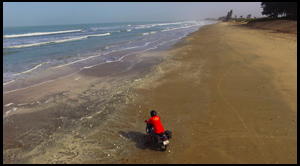
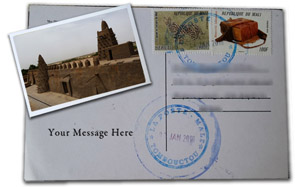
Phil,
I am officially addicted to reading about your journeys. Not just what you’re doing throughout your travels, but your writing style ….”Post civil war Abidjan is like a Gbaka engine with the scar tissue of welded rattling parts, stalling but always restarting.” Love it. Just plain love it.
Sending you lots good vibes,
-M
Marissa, hey thanks! I was just checking out your blog, I didn’t know didn’t know you were a culinary student!? Awesome. There may have to be food involved whenever we meet up! B well, Phil
Hi Phil,
Wow, that sounds like an interesting bus adventure! Your photo makes it look like it was a rough trip! At the moment, we only have Northern Africa on our list of places to travel to in Africa. I am not sure I want to be dragging our daughter through parts of war torn Africa. But I am enjoying reading about your adventures there. Stay safe!
Hey Jason, thanks for reading =). It was a rough trip by that point, but it was worth it. I understand your concern about bringing your daughter through West Africa. If you did I would hire a private car or something of the sort. Ghana would be a lot of fun even with a kid and hiring a car wouldn’t set you back too much. B well, Phil
I just signed up to your blogs rss feed. Will you post more on this subject?
great post, thanks for sharing
Phil, you do a bit of a disservice to Houphouët-Boigny. While most definitely a dictator of Ivory Coast, he also had all the infrastructure built that you were making use of. All others since him have just run it in to the ground.
Also, I made this same trip up to Bamako, as well as back and it’s really not dangerous, just boring as hell and all along the way, nobody ever harassed or threatened me despite my obvious whiteness. And that vaccination spot you mentioned is always an issue as well as massive pain, but if you have your vaccinations, they’ll leave you alone.
Hudin, you are right and I should temper my comments above. The bit about running countries into the ground certainly doesn’t apply to Houphouët-Boigny. You are right that other leaders have not been as competent in managing the country, but a big reason for CIV’s fall was the collapse of cocoa prices. Here’s to hoping that Ouattara brings some leadership.
It must be said, however, that there was an absurdly disproportionate investment into Yamoussoukro compared to other parts of the country. Western and Northern Cote d’Ivoire did not benefit much at all from the “Ivorian Miracle.” Houphouët-Boigny could have done a lot more to put CIV on solid ground before the bottom fell out from cocoa.
You are right that the journey is really not dangerous. The only issue of harassment was the yellow fever bit, which like you said, is a pain, but even that turned out to be a minor issue. I am going to be back in Bamako in a month and some time after plan on taking the journey the other way, to Abidjan.
I felt quite the same as you do and am especially revolted by the Basilica which was built solely by Korean laborers, so Ivoirians didn’t even get to benefit from some salaries in that building that has all the charm of a cheap shopping mall. But, when you stand back and take it in scale, you see similar behavior with politicians in the US/EU who favor their home districts as well, albeit not to such a blatant degree. When it comes to post-independence Africa, I generally try to judge based upon the setting as opposed to what I know to be write and wrong as an American/European.
As for taking the bus back, I’d recommend flying unless you really want to see the incredibly dull wasteland of savanna a second time, or felt the need to stop in Bouaké, which is actually a pretty cool town.
Yes, it is the scale that is unfortunate, especially considering how much more could have been done with infrastructure elsewhere. I try to measure my judgment as well, but things like the basilica I find very upsetting.
I have not looked into flying, but the bus is not too bad and it is very cheap. I actually enjoyed a good stretch of the trip in the north around dusk. I would like to visit Bouaké at some point as well.
Cheers,
Phil
Thanks. Interesting story for me. I have lived in Abidjan for three months and have plans to travel by road to Bamako and Ouagadougou.
This is great to hear. I am anticpating this trip this year. Though from your post, it will be less stress-free to stop over for a night or two in Yama. Do you know if the bus can stop in another town apart from Bamako?
Yes, the buses will stop in Sikasso and Bougouni.